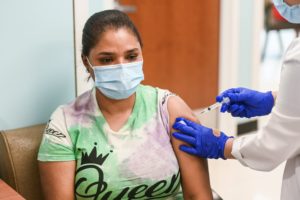
The intensive care unit at St. Bernard Hospital on the South Side of Chicago is at capacity because of the latest surge in the number of COVID-19 cases. Last month, the small hospital treated more than 3 dozen COVID-19 patients, about the same number as in July 2020, just before a bigger wave of illness, which has St. Bernard’s administrators worried.
Rochelle Bello, the hospital’s director of infection prevention stated, “This tells you the trajectory of the COVID impact — it’s only going to go up.” This month, the hospital has already treated 20 people diagnosed with the virus. None of the patients over the past two months were vaccinated and two of them died.
City officials tout the low number of hospitalizations even as the number of COVID-19 cases has increased rapidly in recent weeks. However, some areas, especially low-income communities of color where vaccination rates are low, are getting hit hard.
The Delta variant of the virus, which is about twice as contagious as other forms, is disproportionately affecting Black and Latino communities. Over the last month, Black Chicagoans made up 26% of the city’s total number of COVID-19 cases, yet they accounted for 56% hospitalizations and 65% of deaths.
Combined, Black and Latinos account for 84% of the recent deaths and nearly 3-quarters of all hospitalizations. “I do worry that there are whole parts of Chicago that are just not vaccinated. I see these cases and these hospitalizations and deaths, and these are so largely preventable at this point,” said Dr. Allison Arwady, the city of Chicago’s public health commissioner.
St. Bernard serves people in Englewood, a community that badly trails the rest of the city in people being vaccinated against COVID-19. Less than one-third of those living in the area are fully vaccinated, which is the lowest rate in Chicago.
The low vaccination rates are causing concern as Chicago and Illinois face this latest COVID-19 surge, mainly caused by Delta, which arrived when Mayor Lori Lightfoot announced Chicago’s full reopening in early June. Around the same time, state health officials for the first-time recorded cases of the highly contagious variant.
Dr. Marina Del Rios says “it’s those essential workers such as restaurant employees and housekeepers, she has been seeing lately in the packed emergency room at the University of Illinois Hospital at Chicago on the West Side. Del Rios says she also is seeing people get sick from family gatherings. It’s unlike last year, when most people were keeping in their bubbles and masking and keeping their physical distances. We reopened too quickly. We celebrated too quickly.”

Recent Comments